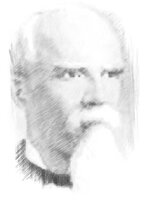John 14
Z-NOTE: March 6, 2024:
 Zorek Richards
Zorek Richards
John 14:6: Jesus answered, “I am the way and the truth and the life. No one comes to the Father except through me."
If you think you're pursuing truth without first pursuing God you are not really pursuing truth. You will more than likely settle with a facsimile of what you accept as truth..tweaked to suit your own desires.. Nothing absolute, and hence, a candidate for being proven wrong at some point. You may accidentally hit some truth but, as Jonathan Edwards referred to it, it would be "speculative knowledge."
This is why the great philosophers offered such different perspectives on what is truth and even offered differing perspectives on who God is Himself.
God is truth. Jesus referred to Himself as "the way, the truth, and the life." What that means is that there is no way, truth, or life, outside of Him. Seeking truth without seeking God is making a statement about yourself and reveals an effort to build upon the prideful independence which motivates you.
God equals truth, and truth equals God. Pursuit of God reveals truth but not necessarily vice versa. With God the truth is usually mind and life altering ("the truth will set you free"). Without pursuing God we leave the answers we find to our own understanding. In other words we define what is truth by what we settle on. And, at best, that is whatever is the result of out own imagination.
Don't settle for less. Pursue God and allow the truth to set you free.
If you think you're pursuing truth without first pursuing God you are not really pursuing truth. You will more than likely settle with a facsimile of what you accept as truth..tweaked to suit your own desires.. Nothing absolute, and hence, a candidate for being proven wrong at some point. You may accidentally hit some truth but, as Jonathan Edwards referred to it, it would be "speculative knowledge."
This is why the great philosophers offered such different perspectives on what is truth and even offered differing perspectives on who God is Himself.
God is truth. Jesus referred to Himself as "the way, the truth, and the life." What that means is that there is no way, truth, or life, outside of Him. Seeking truth without seeking God is making a statement about yourself and reveals an effort to build upon the prideful independence which motivates you.
God equals truth, and truth equals God. Pursuit of God reveals truth but not necessarily vice versa. With God the truth is usually mind and life altering ("the truth will set you free"). Without pursuing God we leave the answers we find to our own understanding. In other words we define what is truth by what we settle on. And, at best, that is whatever is the result of out own imagination.
Don't settle for less. Pursue God and allow the truth to set you free.
 Walter R Martin
Walter R Martin
It should be carefully noted that Jesus did not say, "I am one of the equally good ways" or "I am a better way than the others, I am an aspect of truth; I am a fragment of the life." Instead, His claim was absolute, and allegiance to Him as the Savior of the world, was to take precedence over all the claims of men and religions. --Walter Martin
 James Hastings
James Hastings
"The phrase "I am Life." points to all Christ's work upon us as a life-giving Spirit, a Quickener and an Inspirer. Dead men cannot walk a road. It is no use making a path if it starts from a cemetery. Christ taught that men apart from Him are dead, and that the only life that they can have by which they can be knit to God is the Divine life which was in Himself, and of which He is the source and the principle for the whole world."
-James Hastings; The Greatest Texts of the Bible John I-XII; 1912
-James Hastings; The Greatest Texts of the Bible John I-XII; 1912
Scripture reveals that "truth" is a Person, a message and a lifestyle. Jesus said, "I am the way and the truth and the life. No one comes to the Father except through me." (John 14:6) You will never know truth until you know Jesus.
Christ is the way from man to the Father. The great difficulty is how is sin to be put away? Many attempts have been made to remove it, but there is no way of escaping it from the guilt of sin except by Jesus Christ. Some have hoped for pardon from future good conduct, but the payment of a future debt can by no means discharge a past debt, so that even the perfect future obedience of man could not touch his past sins. Self-righteousness, therefore, even it is could reach perfection would not be "the way." Some hope must from the mercy of God, but the law knows nothing of clearing the sinner of guilt by a sovereign act of mercy. That cannot be done, for when Gods justice would be impugned, His law would be virtually annulled. He will by no means clear the guilty. Every transgression must have its just recompense of reward, so that the absolute mercy of God as such is not the way out of guilt of sin, for that mercy of God as such is not the way out of the guilt of sin, for that mercy is blocked by avenging justice, and over the face of that mercy there passes am eclipsing shadow, because God is righteous as well as gracious. There is no way by which a sinner can escape from the guilt of sin but that which is revealed ion Jesus Christ.
Truth is God’s method of leading us into paths instigated by His wisdom and understanding. Truth is not subject to personal interpretation as much of our culture suggests. It is concretely founded on the character of God, revealed in the Word of God. Truth acts like a flashlight to illuminate the direction and purposes God has in each situation. Thus, when we walk outside of truth, we are walking in darkness. We cannot see which steps to take, and thus can be overcome by all sorts of dangerous realities. It should be obvious that truth is a powerful and potent force!
If you think you're pursuing truth without first pursuing God you are not really pursuing truth. You will more than likely settle with a facsimile of what you accept as truth and may even create your own dogma with or without religious trimmings.....tweaked to suit your own desires.. ...but nothing absolute, and hence, a candidate for being proven wrong at some point. You may accidentally hit some truth but, as Jonathan Edwards referred to it, it would be "speculative knowledge."
This is why the great philosophers offered such different perspectives on what is truth and even offered differing perspectives on who God is Himself.
God is truth. Jesus referred to Himself as "the way, the truth, and the life." What that means is that there is no way, truth, or life, outside of Him. Seeking truth without seeking God is making a statement about yourself and reveals an effort to build upon the prideful independence which motivates you.
God equals truth, and truth equals God. Pursuit of God reveals truth but not necessarily vice versa. With God the truth is usually mind and life altering ("the truth will set you free"). Without pursuing God we leave the answers we find to our own understanding. In other words we define what is truth by what we settle on. And, at best, that is whatever is the result of out own imagination.
Don't settle for less. Pursue God and allow the truth to set you free.
This is why the great philosophers offered such different perspectives on what is truth and even offered differing perspectives on who God is Himself.
God is truth. Jesus referred to Himself as "the way, the truth, and the life." What that means is that there is no way, truth, or life, outside of Him. Seeking truth without seeking God is making a statement about yourself and reveals an effort to build upon the prideful independence which motivates you.
God equals truth, and truth equals God. Pursuit of God reveals truth but not necessarily vice versa. With God the truth is usually mind and life altering ("the truth will set you free"). Without pursuing God we leave the answers we find to our own understanding. In other words we define what is truth by what we settle on. And, at best, that is whatever is the result of out own imagination.
Don't settle for less. Pursue God and allow the truth to set you free.
|
John 14:9:
Jesus answered: “Don’t you know me, Philip, even after I have been among you such a long time? Anyone who has seen me has seen the Father. How can you say, ‘Show us the Father’? |
Friendship means identity in thought and heart and spirit. In Jesus we see the love, the compassion, the mercy, the seeking heart, the purity of God as nowhere else in all the world.
We must be clear in our minds as to "knowing" what Jesus Christ means. |
|
John 14:13-14:
And whatever you ask in My name, that I will do, that the Father may be glorified in the Son. If you ask anything in My name, I will do it. |
 Martin Luther
Martin Luther
What does Christ mean when He says, “I will do whatever you ask in my name”? I would think He should say, “What you ask the Father in my name, he will do.” But Christ is pointing to Himself in this passage.
These are peculiar words coming from a human being. How can a mere man make such lofty claims? With these simple words, Christ clearly states that He is the true and almighty God, equal with the Father. For whoever says, “Whatever you ask, I will do,” is saying, “I am God, Who can and will give you everything.” Why else should Christians pray in Jesus’ Name? Who do people call on saints as helpers in times of need?
Some call for Saint George for protection in War, Saint Sebastian for protection from pestilence, and others for other circumstances; obviously, they believe that these saints will somehow answer their prayers.
But Christ claims this role for Himself. In other words, He is saying, “I won’t command others to do whatever you ask for, I will do it Myself.” So He is the One Who can help in every situation with what we need. He is mightier than the devil, sin, death, the world, and all creation. No being—whether human or angelic—has ever had, or ever will have, such power. Christ possesses all of God’s power and strength.
Here Christ sums up what we can ask Him for in prayer, He doesn’t limit His promise by adding, “That is, only if you ask for gold and silver or for something that other people can give you.” Rather, He says that He will do “whatever you ask.” --Martin Luther
These are peculiar words coming from a human being. How can a mere man make such lofty claims? With these simple words, Christ clearly states that He is the true and almighty God, equal with the Father. For whoever says, “Whatever you ask, I will do,” is saying, “I am God, Who can and will give you everything.” Why else should Christians pray in Jesus’ Name? Who do people call on saints as helpers in times of need?
Some call for Saint George for protection in War, Saint Sebastian for protection from pestilence, and others for other circumstances; obviously, they believe that these saints will somehow answer their prayers.
But Christ claims this role for Himself. In other words, He is saying, “I won’t command others to do whatever you ask for, I will do it Myself.” So He is the One Who can help in every situation with what we need. He is mightier than the devil, sin, death, the world, and all creation. No being—whether human or angelic—has ever had, or ever will have, such power. Christ possesses all of God’s power and strength.
Here Christ sums up what we can ask Him for in prayer, He doesn’t limit His promise by adding, “That is, only if you ask for gold and silver or for something that other people can give you.” Rather, He says that He will do “whatever you ask.” --Martin Luther
 EM Bounds
EM Bounds
Jesus Christ commits Himself to the force of prayer. “Whatsoever ye ask in My Name,” He says, “that will I do, that the Father may be glorified in the Son. If ye shall ask anything in My Name, I will do it.” And again: “If ye abide in Me, and My words abide in you, ye shall ask what he will and it shall be done unto you.” To no other energy is the promise of God committed as to that of prayer. Upon no other force are the purposes of God so dependent as this one of prayer. The Word of God dilates on the results and necessity of prayer. The work of God stays or advances as prayer puts forth its strength. Prophets and apostles have urged the utility, force and necessity of prayer. “I have set watchmen upon thy walls, O Jerusalem, which shall never hold their peace day nor night. Ye that make mention of the Lord, keep not silence, and give him no rest, till he establish, and till he make Jerusalem a praise in the earth.” Prayer, with its antecedents and attendants, is the one and only condition of the final triumph of the Gospel. It is the one and only condition which honours the Father and glorifies the Son. Little and poor praying has weakened Christ’s power on earth, postponed the glorious results of His reign, and retired God from His sovereignty. Prayer puts God’s work in His hands, and keeps it there. It looks to Him --EM Bounds; The Weapon of Prayer; 1931
 Chip Ingram
Chip Ingram
On the night before Jesus’ death, he told his disciples:
“If you love me, keep my commands. Whoever has my commands and keeps them is the one who loves me. The one who loves me will be loved by my Father, and I too will love them and show myself to them.” (John 14:15, 21)
Jesus makes it clear that if we truly love Him then we will show it by obeying His commands — to love Him and others, and to show the world what God is like.
This kind of obedience to God isn’t just some external act where we strive to “do the right thing” or somehow earn His favor. It should flow out of love, never guilt or outward performance.
But, why does God require our obedience if we love Him?
Obedience is the organ through which intimacy with God is obtained.
Even Jesus connects His love for the Father through His submission and obedience to the Father’s will. He… for the joy set before him… endured the cross (Hebrews 12:2) Jesus obeyed the Father and willingly chose to go to the cross. Why? — Because He loves us and wants the world to know the Father’s love.
Today, Christ is inviting each of us to love Him through our obedience to Him. This doesn’t mean that we won’t struggle with our temptation to sin, but we are able make different choices through the power of the Holy Spirit.
---Chip Ingram; Living on the Edge; Does Love Equal Obedience?
“If you love me, keep my commands. Whoever has my commands and keeps them is the one who loves me. The one who loves me will be loved by my Father, and I too will love them and show myself to them.” (John 14:15, 21)
Jesus makes it clear that if we truly love Him then we will show it by obeying His commands — to love Him and others, and to show the world what God is like.
This kind of obedience to God isn’t just some external act where we strive to “do the right thing” or somehow earn His favor. It should flow out of love, never guilt or outward performance.
But, why does God require our obedience if we love Him?
Obedience is the organ through which intimacy with God is obtained.
Even Jesus connects His love for the Father through His submission and obedience to the Father’s will. He… for the joy set before him… endured the cross (Hebrews 12:2) Jesus obeyed the Father and willingly chose to go to the cross. Why? — Because He loves us and wants the world to know the Father’s love.
Today, Christ is inviting each of us to love Him through our obedience to Him. This doesn’t mean that we won’t struggle with our temptation to sin, but we are able make different choices through the power of the Holy Spirit.
---Chip Ingram; Living on the Edge; Does Love Equal Obedience?
|
John 14:23:
Jesus answered and said to him, “If anyone loves Me, he will keep My word; and My Father will love him, and We will come to him and make Our home. |
"Words" in the original is singular "word." The whole of the Scriptures is one word although composed of many words.
|
|
John 14:27:
“Peace I leave with you, my peace I give unto you: not as the world giveth, give I unto you. Let not your heart be troubled, neither let it be afraid.” |
Peace is the translation from the Hebrew word “Shalom”. This is usually a common greeting by the Jews. The word 'Shalom does not mean the absence of troubles or worries. It refers to a deep sense of wholeness which can also be translated as wellness.
Shalom may therefore be used to describe a personal inward and lasting peace but it is now adopted by everyone including unbelievers. The peace Jesus is talking about here is the inner peace or calmness in your heart despite troubles. It does not depend on your circumstances, nor does it eradicate worries or anxieties but gives you the ability to endure with strong confidence that God will see you through. -Christian Walls |















